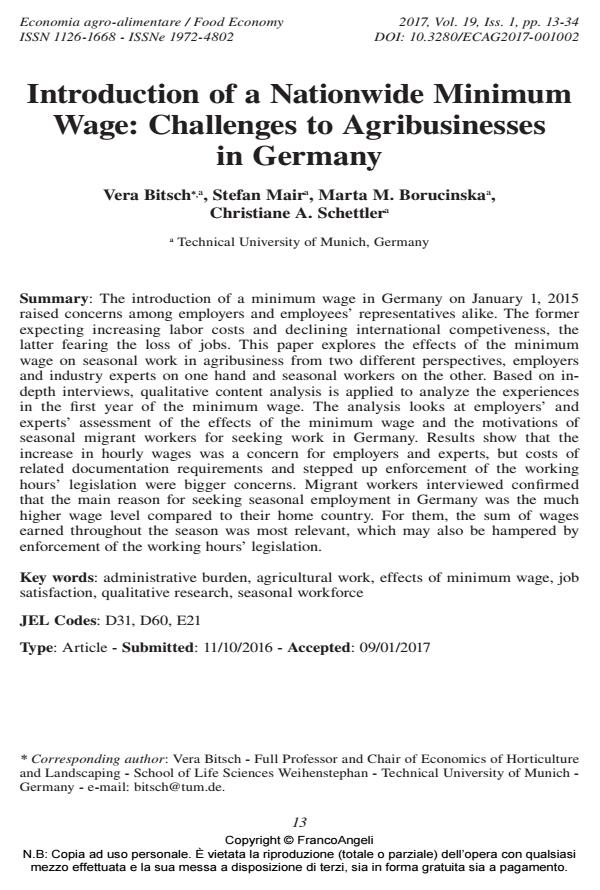Introduction of a Nationwide Minimum Wage: Challenges to Agribusinesses in Germany
Titolo Rivista ECONOMIA AGRO-ALIMENTARE
Autori/Curatori Vera Bitsch, Stefan Mair, Marta M. Borucinska, Christiane A. Schettler
Anno di pubblicazione 2017 Fascicolo 2017/1
Lingua Inglese Numero pagine 22 P. 13-34 Dimensione file 164 KB
DOI 10.3280/ECAG2017-001002
Il DOI è il codice a barre della proprietà intellettuale: per saperne di più
clicca qui
Qui sotto puoi vedere in anteprima la prima pagina di questo articolo.
Se questo articolo ti interessa, lo puoi acquistare (e scaricare in formato pdf) seguendo le facili indicazioni per acquistare il download credit. Acquista Download Credits per scaricare questo Articolo in formato PDF

FrancoAngeli è membro della Publishers International Linking Association, Inc (PILA), associazione indipendente e non profit per facilitare (attraverso i servizi tecnologici implementati da CrossRef.org) l’accesso degli studiosi ai contenuti digitali nelle pubblicazioni professionali e scientifiche.
The introduction of a minimum wage in Germany on January 1, 2015 raised concerns among employers and employees’ representatives alike. The former expecting increasing labor costs and declining international competiveness, the latter fearing the loss of jobs. This paper explores the effects of the minimum wage on seasonal work in agribusiness from two different perspectives, employers and industry experts on one hand and seasonal workers on the other. Based on indepth interviews, qualitative content analysis is applied to analyze the experiences in the first year of the minimum wage. The analysis looks at employers’ and experts’ assessment of the effects of the minimum wage and the motivations of seasonal migrant workers for seeking work in Germany. Results show that the increase in hourly wages was a concern for employers and experts, but costs of related documentation requirements and stepped up enforcement of the working hours’ legislation were bigger concerns. Migrant workers interviewed confirmed that the main reason for seeking seasonal employment in Germany was the much higher wage level compared to their home country. For them, the sum of wages earned throughout the season was most relevant, which may also be hampered by enforcement of the working hours’ legislation.
Parole chiave:Administrative burden, agricultural work, effects of minimum wage, job satisfaction, qualitative research, seasonal workforce
- The Gangmaster Licensing Authority: An Institution Able to Tackle Labour Exploitation? Johanna Katharina Schenner, in ECONOMIA AGRO-ALIMENTARE 3/2017 pp.357
DOI: 10.3280/ECAG2017-003004 - Driving forces and characteristics of the value chain of flowering potted plants for the German market N. Havardi-Burger, H. Mempel, V. Bitsch, in European Journal of Horticultural Science /2020 pp.267
DOI: 10.17660/eJHS.2020/85.4.8 - The Governance of the Horticultural Supply Chain in the United Kingdom: A Source of Forced Labour? Johanna Katharina Schenner, in ECONOMIA AGRO-ALIMENTARE 1/2018 pp.29
DOI: 10.3280/ECAG2018-001003
Vera Bitsch, Stefan Mair, Marta M. Borucinska, Christiane A. Schettler, Introduction of a Nationwide Minimum Wage: Challenges to Agribusinesses in Germany in "ECONOMIA AGRO-ALIMENTARE" 1/2017, pp 13-34, DOI: 10.3280/ECAG2017-001002